Key takeaways:
- Resilience in parenting involves teaching children to learn from setbacks and develop life skills through adversity.
- Modeling problem-solving skills and fostering a growth mindset can significantly enhance children’s resilience.
- Open discussions about challenges and small victories in daily life can transform difficult experiences into valuable lessons.
- Utilizing resources like books, podcasts, and community workshops can further support the development of resilience in both parents and children.
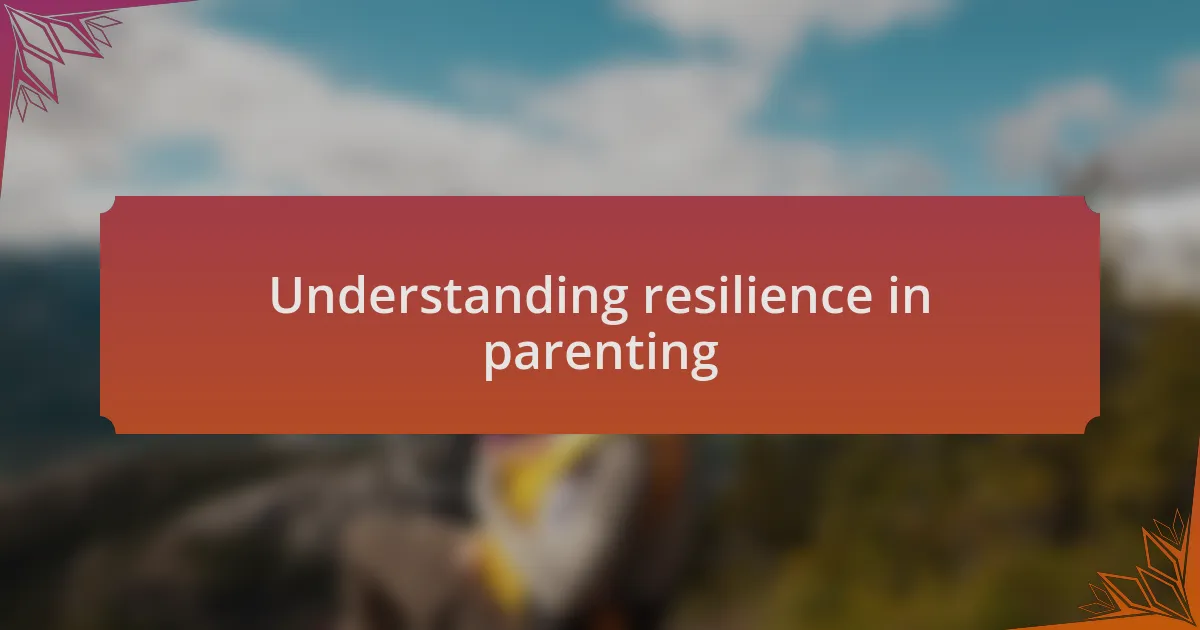
Understanding resilience in parenting
Resilience in parenting is not just about enduring tough times; it’s about teaching our children how to navigate life’s challenges. I remember a day when my child faced a setback at school and was disheartened. Instead of rushing to fix it, I encouraged them to reflect on what they could learn and how they could apply it next time. Did I want to shield them from disappointment? Absolutely, but I knew that resilience was something they had to build themselves.
As I observe my friends who face similar struggles, I realize resilience often blooms from adversity. One friend had a child who faced bullying, a painful experience that led not only to tears but also to profound lessons in self-advocacy and empathy. It makes me wonder: how can those tough moments shape the person’s character over time? Each hardship carries a seed of growth, and it’s our job as parents to help our kids cultivate that potential.
Think about the moments when you’ve had to pick yourself up after a setback. Haven’t those experiences equipped you with invaluable life skills? In my own life, I’ve found that each mistake or failure reveals something crucial about vulnerability and strength, and I strive to pass that understanding onto my children. By sharing my journey, I foster an environment where resilience becomes a family value.
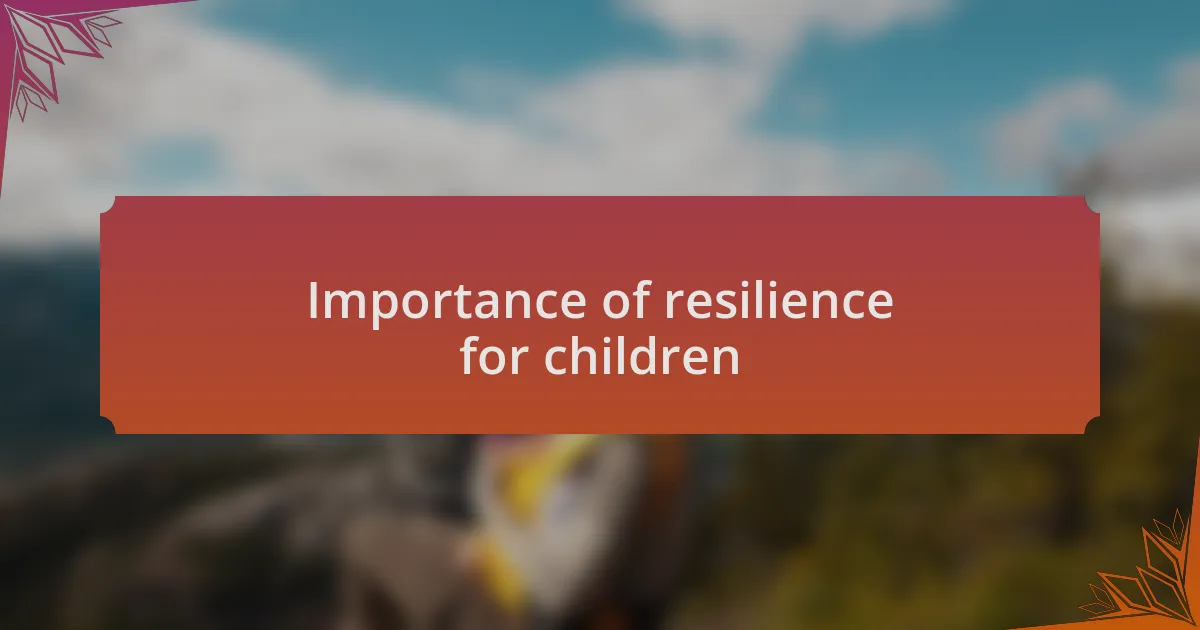
Importance of resilience for children
The importance of resilience for children cannot be overstated. I recall a time when my son struggled in a soccer match; he missed crucial goals and felt deeply discouraged. Instead of focusing on the loss, I asked him what he thought was the most valuable lesson he learned that day. To my surprise, he said it was all about teamwork and how to support his friends, illustrating that failures can foster important life skills.
When children learn to cope with disappointments, they become better equipped for future challenges. I’ve witnessed this firsthand with my daughter, who faced a tough time transitioning to a new school. Rather than withdrawing, she rallied her courage, developed friendships, and emerged stronger. Doesn’t it amaze you how those difficult experiences can refine their character? Each step they take towards resilience contributes to their emotional toolkit.
Encouraging resilience also helps children understand that setbacks are a natural part of life. I’ve shared stories from my career where setbacks led to unexpected opportunities, emphasizing that growth often sprouts from difficulty. Isn’t it reassuring to know that these tough times can be valuable teaching moments? By nurturing their resilience, we instill in our children the belief that they can navigate whatever life throws their way.
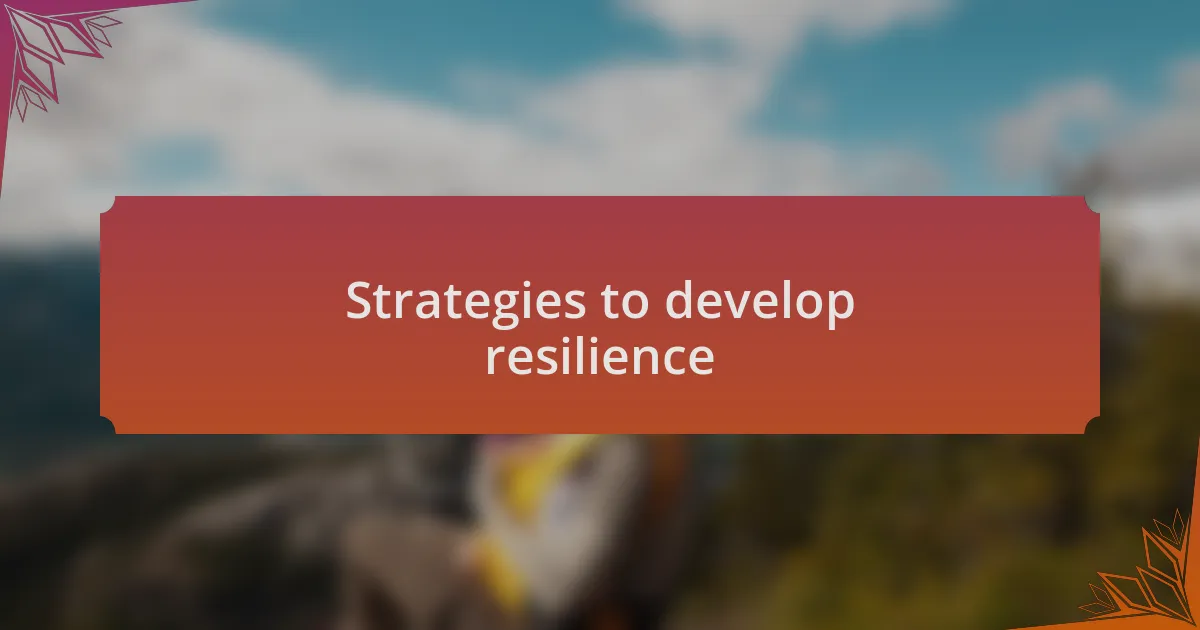
Strategies to develop resilience
One effective strategy to develop resilience in children is to model problem-solving skills during challenging situations. I remember when I faced a particularly frustrating issue at work, like missing an important deadline. Instead of sulking, I sat down with my daughter to brainstorm solutions. This not only demonstrated how to tackle problems head-on but also opened the door for her to express her thoughts on overcoming hurdles. Have you considered how your approach in moments of stress can shape your child’s mindset?
Another powerful tactic is encouraging a growth mindset. When my son struggled with math, rather than tell him he just wasn’t good at it, I highlighted the importance of effort over innate ability. I often reminded him that intelligence can grow with practice. I could see the light in his eyes when he finally solved a challenging problem. Could this shift in perspective help your child view challenges as opportunities for growth rather than roadblocks?
Lastly, fostering connections with peers can significantly enhance resilience. I’ve seen how my daughter’s friendships have provided a support system during tough times, like dealing with a family move. They share advice, lend an ear, and create a sense of belonging that amplifies their ability to bounce back. How vital do you think those social connections are to building emotional strength?
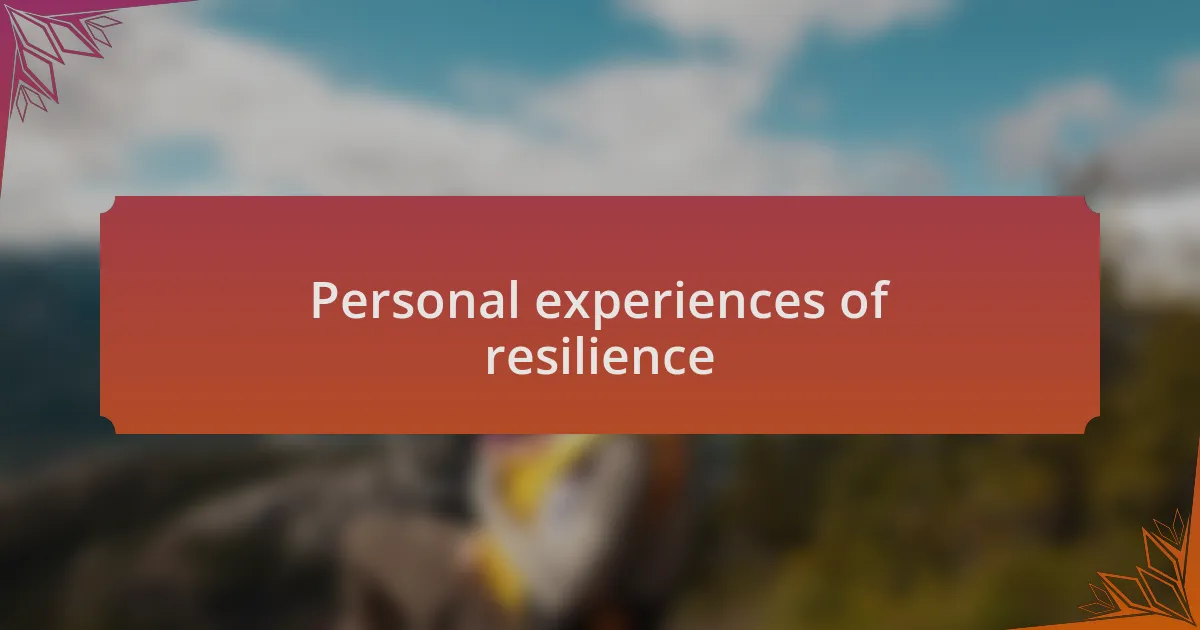
Personal experiences of resilience
When I reflect on my own journey, I think of the time I faced a significant health challenge. Each day felt like an uphill battle, and there were moments when I wanted to give in to despair. Yet, I learned to rely on small, daily victories—like taking a short walk or cooking a healthy meal. How often do we overlook the importance of celebrating these seemingly minor achievements in the grand scheme of resilience?
Another experience that stands out is when I navigated my child’s transition to a new school. The first few weeks were fraught with tears and uncertainty. I vividly remember sitting together on the floor of her room, surrounded by piles of art supplies, as we painted our feelings. This creative outlet not only helped her process those emotions but also allowed us to build a stronger bond through shared vulnerability. Have you ever found that art or creativity can be a pathway to emotional healing in your family?
Lastly, I think about a time when I had to deal with a tough financial decision that affected our family’s stability. Instead of hiding my stress, I chose to talk openly with my kids about budgeting and setting priorities. Their thoughtful questions and suggestions surprised me; they presented a fresh perspective I hadn’t considered. In what ways can openness in difficult situations empower our children to grow through adversity?
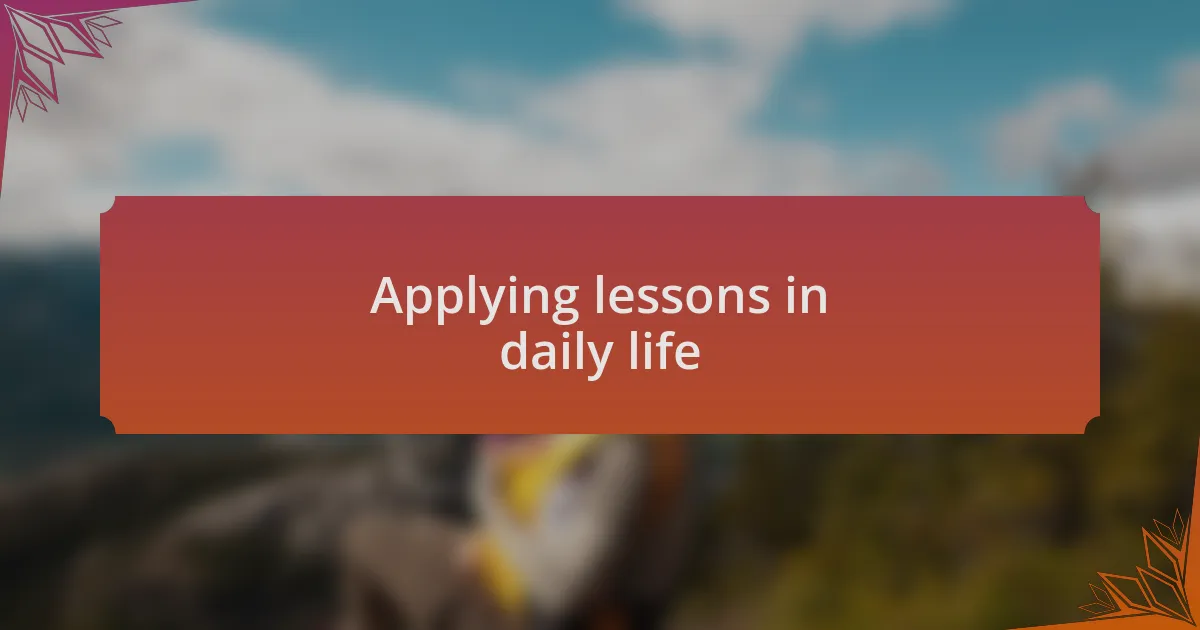
Applying lessons in daily life
Resilience isn’t just a concept for me; it’s something I actively weave into the fabric of our daily lives. For instance, after my father passed away, I made a point to openly discuss grief with my children during our family dinners. We would share stories that made us laugh and reminisce, transforming a painful topic into a celebration of his life. How often do we forget that the space we create around difficult conversations can turn them into powerful lessons in resilience?
One day, my son faced a tough situation when he didn’t make the soccer team. Instead of letting him sulk in disappointment, we turned it into an opportunity. We sat down with a pair of old soccer shoes and mapped out his training plan for next season. Our impromptu goal-setting session transformed his sadness into motivation. Have you considered how setbacks can be reframed as stepping stones for growth?
I also remember a time when my daughter felt overwhelmed by schoolwork. Rather than letting her agonize over it, I encouraged her to break tasks down into smaller, manageable pieces. We even created a colorful chart that highlighted her progress. It was astonishing to see her sense of accomplishment grow with each small win. In what ways can we, as parents, help children view challenges as opportunities for personal development?
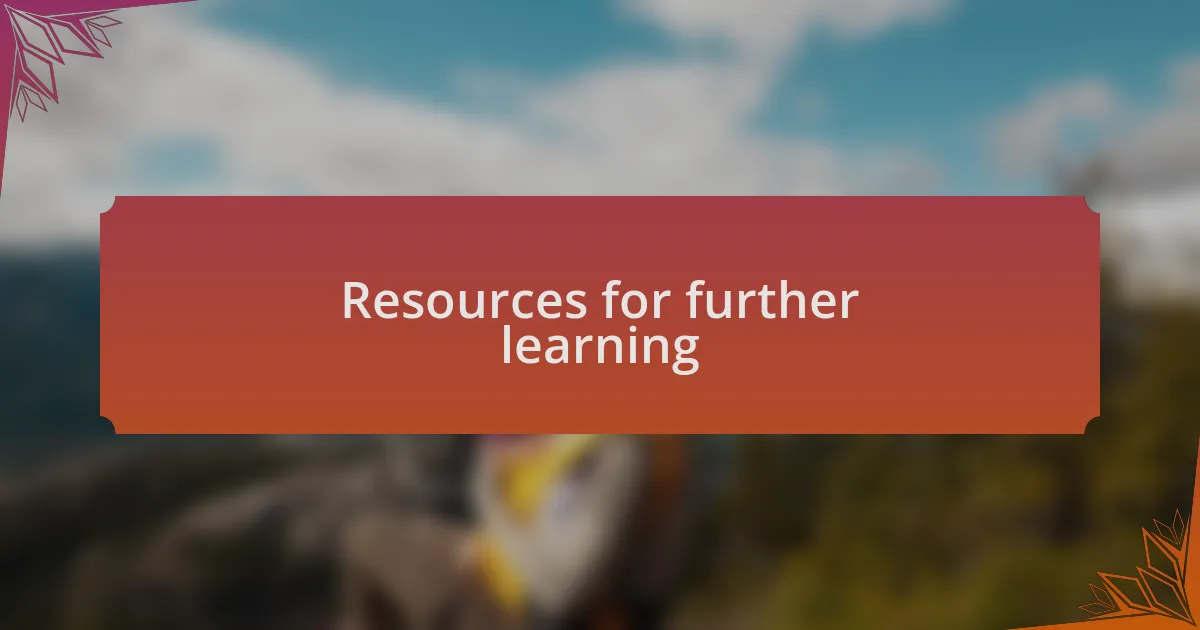
Resources for further learning
Resources for further learning can be invaluable in nurturing resilience in both ourselves and our children. For instance, I stumbled upon a wonderful book titled “The Resilience Factor” by Karen Reivich and Andrew Shatté, which delves into practical strategies for bouncing back from adversity. It resonated with me because it emphasizes the power of mindset, encouraging readers to embrace challenges rather than shy away from them. Have you ever considered how a good book can shift your perspective on everyday obstacles?
Listening to podcasts has also been a game-changer for me. “The Happiness Lab” featuring Dr. Laurie Santos is a rich resource that explores the psychology behind happiness and resilience. One episode in particular reminded me of how small changes in our daily habits can significantly impact our overall well-being. Isn’t it fascinating to think that a simple conversation with an expert can spark new ideas in our parenting journey?
Moreover, seeking out community workshops can provide hands-on experiences to reinforce resilience. I once attended a local seminar focused on parenting strategies during difficult times, where we practiced role-playing scenarios with other parents. This experience not only enhanced my skills but also created a supportive network that I still rely on today. How often do we underestimate the value of shared learning and connection in our parenting journey?